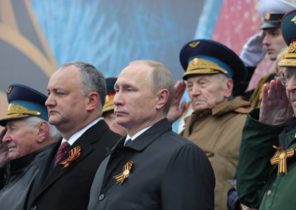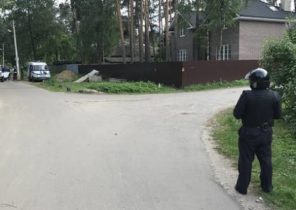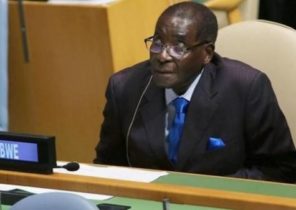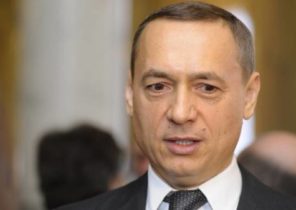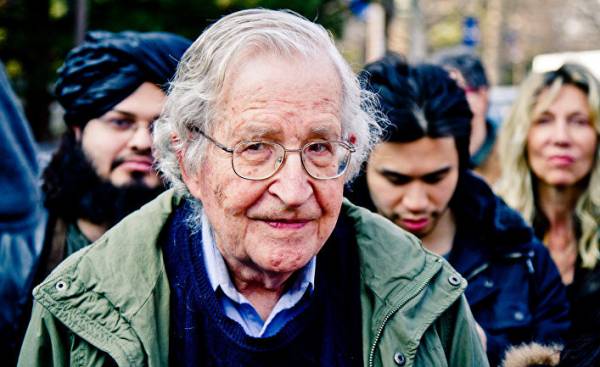
In recent months the alarming prospect of the Board of administration of the tramp has become a disturbing reality, and I decided to get in touch with philosopher Noam Chomsky, whose works, performances and social activities more than half a century challenges the American and world political system and divided unsurpassed in its depth observations. The conversation took place in the form of an exchange of emails, and lasted two months. Professor Chomsky was very busy, but because of our intellectual conversations, he graciously spent time with me for this interview.
Professor Chomsky is the author of numerous books of political subjects, which have become bestsellers and translated into many languages. To the last his works include “Hegemony or a fight for survival” “failed States, Hopes and prospects,” “Masters of mankind” and “Who rules the world?” Since 1976 he is Professor Emeritus at the Massachusetts Institute of technology.
George Yancy: In terms of the political moment of “post-truth” and the strengthening of authoritarianism, which we have seen began under President trump what public role, in your opinion, can play professional philosophy in the critical evaluation of this situation?
Noam Chomsky: We must be careful not to shoot from guns on sparrows. In this time of “post-truth” so absurd that the best reaction to it is a joke. Here is a very relevant example given in the comments of satirist Stephen Colbert. The Republican legislature of North Carolina in response to a scientific study that predicted dangerous sea level rise, forbade local authorities and state agencies to develop policy and to draft documents to solve this problem. Colbert in response, said, “a Brilliant solution. If science gives you a result that you don’t like, take the law that declares such a result is illegal. And the problem is solved”.
In this administration trump solves the major problems of survival of organized human life: prohibiting regulations, research and even discussions about threats to the environment and the flight to the edge of a race (for the sake of short-term profit and power).
In this respect, it seems to me that trump is a little like suicide.
Of course, ridicule is not enough. You must respond to the concerns and opinions of those who are suffering from deceit, or who does not recognize the nature and importance of these issues for some other reasons. If by philosophy we mean a thoughtful and reasoned analysis, then it is able to give answers to such questions, but not at the expense of countering the “alternative facts”, and by examining and clarifying what is at stake, whatever the problem. In addition, we need action, immediate action and focused all the areas available to us.
— When I studied philosophy at the University of Pittsburgh where I majored in the tradition of analytic philosophy, I could not understand what is the meaning of philosophy, in addition to the clarification of ideas and concepts. But I held the point of view of Marx, that philosophy can change the world. What is your opinion about that philosophy can change the world?
— I do not really understand what was meant by Marx when he wrote: “Until now philosophers have only had interpreted the world; but the point is to change it”. If he wanted to say that philosophy can change the world, or that philosophers should do more of a priority to change the world? If Marx meant the former, then he probably meant the philosophy in the broad sense of the word, including the analysis of social order and ideas about what should be changed and how. In this broad sense, philosophy can play a specific and very important role in changing the world. And philosophers, including adherents of the tradition of analytic philosophy, made such attempts in his philosophical writings and in his public life. A famous example is Bertrand Russell.
Yes. Russell was a philosopher and intellectual as a public figure. In this regard, would you describe yourself?
— Honestly, I never thought about it. I do the work and activities that I think is important and exciting. Part of it falls into these categories in their normal sense.
— There are times when human suffering seems unbearable. You’re talking a lot about the suffering in the world. As you can observing all this, save the strength to move on?
To be a witness to that is a strong enough motive to move on. There is nothing more inspiring than to watch as the poor and suffering people, living in conditions far worse than we do, quietly and humbly continue to lead their courageous and determined struggle for justice and dignity.
— If you were asked to name two or three forms of political action that are required under the regime trump, what would you mention? I’m asking about this because our time seems incredibly hopeless and oppressive.
— I don’t think is all that bad. Remember the success of Bernie Sanders during the election campaign; it is the most remarkable feature of elections in 2016. There is nothing surprising in the fact that showman billionaire in the strong support of the media (including liberal, came to love its eccentricities and advertising revenues which he gave them) was the candidate of the ultra-Republican party.
But the Sanders campaign was radically different from the political history of the United States over the last hundred years. Extensive research of political scientists, especially Thomas Ferguson (Thomas Ferguson), strongly suggest that elections are often bought. For example, only the costs of the election headquarters is a very reliable indicator of electoral success. And support of corporate power and private wealth is almost a prerequisite even to participate in the political struggle.
Campaign Sanders showed that the applicant with a relatively progressive program (in fact, it was the “New deal” like Roosevelt) may be nominated by the party and may even win elections, and without financial and other support of major sponsors and the media. There are many reasons to believe that Sanders could win the nomination if not for the machinations of party apparatchiks of Obama-Clinton. Today it is the most popular politician in the country, far ahead of the rest.
Generated by his staff the activity starts to penetrate into electoral politics. Under Barack Obama, the Democratic party virtually collapsed at the local level and at the state level, but it can be revived and turned into a progressive force. This means that you need to restore the legacy of the New deal and to go much further instead of throwing the working class to their fate and turn into the Clinton “new Democrats”, which more or less resemble those used to be called moderate Republicans. This is the category that had largely disappeared from the political arena shifted to the right of both parties in the neoliberal period.
Such a prospect is hardly realistic, but attempts to go in this direction you can combine with the activity of the direct involvement right now, because it is urgently needed to counteract the legislative and Executive work of a Republican administration, which often hide behind the bluster and rhetoric of a man who is the nominal head.
In fact, there are many ways of dealing with trump’s project to create a tiny America, which is isolated from the world, tremble with fear, for it erected the walls and holds the internal politics in the manner of [speaker of the house of representatives] Paul Ryan (Paul Ryan), representing the most barbaric wing of the Republican establishment.
— What are the most serious problems facing us?
— The most important questions to be addressed are threats to our existence: climate change and nuclear war. Regarding the first question, the Republican leadership in splendid isolation from the rest of the world almost unanimously seeks to destroy all our chances of a decent living. It is sharp but there is no exaggeration. At the local and state level we can conclude an important agreement on combating this malignant project.
As for nuclear war, the actions in Syria and the Russian border creating a very serious risk of confrontation, which is able to provoke a war, which is absolutely unthinkable. Further, the extreme danger of actions trump on Obama’s implementation of programs of modernization of nuclear forces. As we recently learned, modernized US nuclear forces, will significantly weaken that thin thread that holds our survival. This issue was seriously discussed in a very important article that appeared in March in the journal Bulletin of the Atomic Scientists (Bulletin of atomic scientists), which was a long time to become the main front page news. The authors of the article, a very reputable analysts, noted that the program of modernization of nuclear weapons have increased “shared the amazing ability of the American ballistic missile about three times”. They state: “This program creates exactly what can be expected if nuclear, the government intends to acquire the possibility for nuclear war and victory in it through disarmament of the enemy by a sudden first strike.”
The significance of this very clear. This means that in the event of a crisis, and there are now too many, the Russian military can conclude that in the absence of credible deterrence is the only hope for survival is the first blow that will lead us all to ruin.
That sounds scary.
In such circumstances, the civil action can stop an extremely dangerous program. Citizens can also force Washington to seek diplomatic solutions that exist, instead of almost reflexively resort to force and compulsion in other areas, such as North Korea and Iran.
— Noam, you continue its important fight against injustice. What causes in you this sense of social justice? Are there any religious motives that affect your fight for social justice? If not, why not?
— No religious motives, and with good reason. Religious motives can justify literally any action you choose, from a commitment to Grand ideals to support the most horrific atrocities. In sacred texts we can find inspirational messages of peace, justice and mercy, but in the canonical literature there are passages with the most vicious appeals. We must be guided by conscience, in whatever wrapper we neither wrapped.
— Back to the topic of untold human suffering. What can you recommend me to tell my students to embrace the suffering endured by many, and that is much worse than just the fact that we have to endure them? Many students only think about how to get a degree, and suffering in the world, they are often very a little concerned.
— I suspect that those who do not notice the suffering — both nearby and in the remotest corners — for the most part don’t know about them, and maybe they are blinded by doctrine and ideology. They need to form a critical attitude towards the dogmas of faith, both secular and religious, need to develop their ability to question, to explore, to analyze, to look at the world from the standpoint of other people. And the opportunity they have always been, and near, wherever they live. This homeless man, shivering in the cold and asking for a trifle to buy food, and much, much more.
— I appreciate and support your opinion about sensitivity to the suffering of others that are close by. Going back to Trump, I assume you believe it is perfectly unpredictable. I definitely think so. Do we have at the moment and in the current environment, fear of a nuclear exchange of any kind?
— It is necessary, and such concerns certainly exist, not only me. Perhaps the most outstanding people from among those who Express such concerns, William Perry (William Perry), one of the leading nuclear strategists of our time, has worked for many years at the highest levels of nuclear planning and have accumulated rich experience. He is calm and careful, and is not to exaggerate. He returned to the public scene, and today strongly and convincingly suggests that scaring him a serious and growing threat and the reluctance of people to listen to them and think. According to Perry, “today the risk of nuclear disaster in one form or another is much higher than in the cold war years, but most people are in blissful ignorance, unaware of this danger.”
In 1947 the Bulletin of atomic scientists began to publish the famous doomsday Clock, showing how much is left until midnight, that is, to total destruction. In 1947, the analysts established the time on the clock seven minutes to twelve. In 1953, when the United States and the Soviet Union detonated the hydrogen bomb, they moved the arrow on two minutes to midnight. Since then it varies, but never reaches a dangerous point. In January, shortly after the inauguration of the trump, this arrow was installed at a point two and a half minutes to midnight, that is, closest to the nuclear disaster in 1953. But this time the scientists took into account not only the increasing threat of nuclear war, but the firm resolve of the Republicans to accelerate the race to ecological catastrophe.
Perry is right about their fears. We all must fear, not least because of the man with his finger on the button, and his assistants, living in a surreal world.
But despite their unpredictability, trump enjoys significant support. Where such obsequious reverence?
— I don’t know if you can call it obsequious reverence, as I have reason to doubt this. For example, who is this base of support? Most is pretty wealthy. In three quarters of the income — above average. One third of the income more than 100 thousand dollars a year, and they are in the top 15% on indicators of personal income. And yet among his supporters the first six percent of those who have only school education. They are overwhelmingly white, mostly older, and so long more privileges.
As noted by Anthony DiMaggio (Anthony DiMaggio) in their work, based on careful analysis of available information, voters trump is usually typical of the Republicans with the “elitist and reactionary social views in favor of corporations” and “wealthy and privileged part of society which has lost part of their privileges after the economic crash of 2008” and was in pretty dire economic Straits. The average income from her 2007 fell by almost 10%. But there is still a large segment of Protestant believers and supporters of the white supremacist, whose racist and generalskie views deeply rooted in the United States.
Most members of this camp tramp and the most brutal wing of the Republican establishment are close in their views and relations, even if we turn to the specific political preferences, it appears more difficult questions.
Some supporters of the trump comes from the industrial sector, which for decades were ignored by both parties. Many of the rural areas, where there was an industry crisis and dramatically increased unemployment. Many voted for Obama, believing his promises of opportunities and change, but quickly became disillusioned and in despair turned in the direction of its notorious class enemy, somehow hoping that the formal leader will come to their rescue.
Another consideration is the current information system, if I may use such a phrase. For many supporters of the trump sources of information are Fox News, talk radio and other distributors of alternative facts. Exposing the violations and absurdities trump, inspiring liberal public opinion, they are easily perceived as attacks on a corrupt elite defender of the common people, when in fact he is a cynical enemy.
— What role is played by the lack of critical intellect that the philosopher John Dewey (John Dewey) considered very important for a democratic society?
Can I ask other questions about critical intelligence. According to liberals, a political crime of the century, as it is sometimes called, is Russia’s intervention in the American elections. The consequences of this crime are not amenable to definition, in contrast to the serious consequences of the intervention of corporate power and private capital, which is considered not a crime but the usual mechanism of democracy. Here we’re not even talking about American “interference” in foreign elections, including in Russian, because it’s ridiculously inefficient, what is known to anyone who at least superficially familiar with recent history.
This is definitely evidence the contradictions of our nation.
— Do Russian hacker hacks more important than what we are discussing here, for example, the national campaign for the destruction of the conditions for the existence of organized society, which is held in defiance of the world? Or the already terrible threat Seestrasse nuclear war? Or even quite real, but less significant crimes such as the initiative of the Republicans, depriving millions of people of health and kicking out helpless people from nursing homes into the street for further enrichment of corporations and capitalists that support the Grand old party? Or limited dismantling of the system of legal regulation, designed to mitigate the consequences of the financial crisis, which the favorites of the Republicans quite can you repeat that? And so on.
It is easy to condemn those whom we put on the opposite side of a split, but more importantly to understand that we will win, being with them on one side.
George Yancy is Professor of philosophy at Emory University, is the author of “Black bodies, white gazes” (Black Bodies, White Gazes), “About race: 34 conversations during the crisis” (On Race: 34 Conversations in a Time of Crisis) and the editor of books “in Pursuit of Trayvon Martin” (Pursuing Trayvon Martin) and “Our black sons, this is important” (Our Black Sons Matter).
